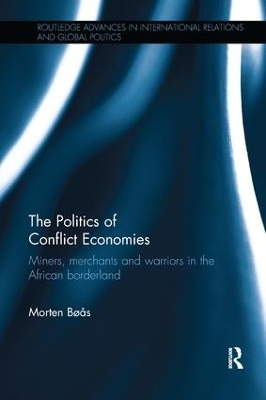
The Politics of Conflict Economies
Miners, merchants and warriors in the African borderland
Seiten
2016
Routledge (Verlag)
978-1-138-23820-6 (ISBN)
Routledge (Verlag)
978-1-138-23820-6 (ISBN)
Conflict economies cannot be approached in isolation but must instead be contextualised socially and historically. These economies did not emerge in vacuum, but are part and parcel of the history of people and place.
This book explores the informal and illicit extraction and trade of minerals and other types of natural resources that takes place in the 'borderlands' during periods of conflict. This type of extraction and marketing, often referred to as ‘conflict trade’ depends on a weak state, and works alongside the structures of the state and its officials. The book emphasises that conflicts do not start as competition over natural resources and in turn suggests that the integration of the extraction and marketing of natural resources only starts once fighting is well under way. Boas argues that although economic agendas are an integral part of African conflicts, the desire to accumulate is not the only motivation. Thus, in order to present a more comprehensive analysis of conflict we need to take into account political, cultural, and historical factors, in addition to the economic dimensions of conflict.
This book will be of very strong interest to students and scholars of political economy, conflict studies, international relations and development.
This book explores the informal and illicit extraction and trade of minerals and other types of natural resources that takes place in the 'borderlands' during periods of conflict. This type of extraction and marketing, often referred to as ‘conflict trade’ depends on a weak state, and works alongside the structures of the state and its officials. The book emphasises that conflicts do not start as competition over natural resources and in turn suggests that the integration of the extraction and marketing of natural resources only starts once fighting is well under way. Boas argues that although economic agendas are an integral part of African conflicts, the desire to accumulate is not the only motivation. Thus, in order to present a more comprehensive analysis of conflict we need to take into account political, cultural, and historical factors, in addition to the economic dimensions of conflict.
This book will be of very strong interest to students and scholars of political economy, conflict studies, international relations and development.
Morten Bøås is Research Professor at the Norwegian Institute of International Affairs (NUPI).
Acknowledgements Prologue: Nakivale 1:05 AM 1. Introduction: life in the borderland 2. Eastern Congo: mines, ‘moles’ and the users of force 3. The great escape? Diamond-mining in the borderland of Sierra Leone 4. Liberia: land, belonging and identity in a border area 5. Northern Mali: criminality, coping, and resistance along an elusive frontier 6. Northern Uganda: displacement and fear in the borderland 7. Navigating Nakivale: the refugee camp as borderland 8. Conclusion: touching from the distance References List of acronyms
| Erscheinungsdatum | 07.01.2017 |
|---|---|
| Reihe/Serie | Routledge Advances in International Relations and Global Politics |
| Verlagsort | London |
| Sprache | englisch |
| Maße | 156 x 234 mm |
| Gewicht | 453 g |
| Themenwelt | Naturwissenschaften ► Biologie ► Ökologie / Naturschutz |
| Sozialwissenschaften ► Politik / Verwaltung ► Europäische / Internationale Politik | |
| Sozialwissenschaften ► Soziologie ► Spezielle Soziologien | |
| Technik ► Bergbau | |
| Wirtschaft ► Volkswirtschaftslehre ► Wirtschaftspolitik | |
| ISBN-10 | 1-138-23820-1 / 1138238201 |
| ISBN-13 | 978-1-138-23820-6 / 9781138238206 |
| Zustand | Neuware |
| Haben Sie eine Frage zum Produkt? |
Mehr entdecken
aus dem Bereich
aus dem Bereich


